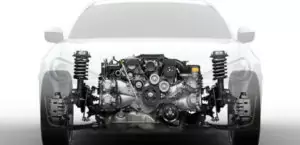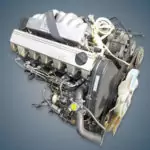The first RB20 engines were installed on the Nissan Skyline R31. Early double overhead camshaft engines are referred to as “Red Top” because they have red caps. Later versions used the ECCS engine management system. There were different versions of 2-liter RB20 engines: RB20E, RB20ET, RB20DE, RB20DE NEO, RB20DET, RB20P, RB20DET-R.
RB20E – the first version, in-line 6-cylinder, in a cast-iron cylinder block, with a short-stroke crankshaft. Covered with an aluminum single-shaft cylinder head with 2 valves per cylinder. Power from 115 to 130 hp, depending on the generation. In general, this version is not widely distributed and does not represent anything interesting, besides, it is very weak.
RB20ET – the next model, released in 1985, was the same RB20E, but with a 0.5 bar turbocharger without an intercooler. Power 170 hp, in some variations – 145 hp.
RB20DE appeared in the same 1985 and it is the most famous 2-liter RB. Its main difference from the RB20E is a two-shaft 24-valve cylinder head with individual ignition coils, as well as a new crankshaft, connecting rods, pistons, intake system, control unit. Camshafts 232/240, lift 7.3/7.8 mm. Such motors developed from 150 hp to 165 hp. The RB20DE engine bends the valve when the timing belt breaks.
RB20DE NEO is a modified RB20DE produced at the end of production since 2000. These motors are distinguished by improved environmental performance, as well as a crankshaft, an intake system, a modernized cylinder head without hydraulic lifters, and a control unit. The power of this engine is 155 hp.
RB20DET was released in the same 1985. This is a turbo version of the above motor. These power plants were equipped with a 16V turbocharger operating at a pressure of 0.5 bar. Under supercharging, the compression ratio was reduced to 8.5, pistons, connecting rods, crankshaft, cylinder head gasket, control unit were replaced, nozzles 270 cc / min were used. Early models (RB20DET Red top for Skyline R31) used NICS intake, 248/240 timing, 7.8/7.8mm lift. With them, the engine developed 180-190 hp, depending on the model. Later, from 1988, they began to use the ECCS system and 240/240 camshafts, 7.8/7.8 mm lift. This motor is commonly referred to as the RB20DET Silver top and has been boosted to 215 hp at 6400 rpm. The RB20DET engine was discontinued in 1993, because the naturally aspirated RB25DE appeared, with approximately the same power.
RB20DE/DET engines do not require valve adjustment, except for RB20DE NEO which are not equipped with hydraulic lifters. The timing drive on the RB20 is belt driven, the timing belt needs to be replaced every 80-100 thousand km.
Specifications
| Manufacturer | Yokohama plant |
| Also called | RB20 |
| Production years | 1984-2002 |
| Cylinder block alloy | cast iron |
| Fuel system | injector |
| Configuration | inline |
| Number of cylinders | 6 |
| Valves per cylinder | 2 4 |
| Piston stroke, mm | 69.7 |
| Cylinder bore, mm | 78 |
| Compression ratio | 10.0 (RB20DE) 9.5 (RB20E) 8.5 (RB20DET) |
| Displacement, cc | 1998 |
| Power output, hp | 115/5600 125/5600 130/5600 145/6000 150/6400 155/6400 165/6400 170/6000 180/6400 190/6400 215/6400 |
| Torque output, Nm / rpm | 167/4000 172/4400 181/4000 206/3200 181/5200 184/5200 186/5600 216/3200 226/3600 240/4800 265/3200 |
| Fuel type | petrol |
| Euro standards | EURO 2/3 |
| Weight, kg | 230 (RB20DE) 245 (RB20DET) |
| Fuel consumption, L/100 km (for Nissan Fairlady 1988) — city — highway — combined |
13.3 9.7 11.0 |
| Oil consumption, gr/1000 km | up to 500 |
| Recommended engine oil | 0W-30 / 5W-30 / 5W-40 / 10W-30 / 10W-40 |
| Engine oil capacity, liter | 4.2 |
| Oil change interval, km | 15000 |
| Normal engine operating temperature, °C | ~90 |
| Engine lifespan, km | ~400 000 |
Disadvantages of the RB20 engine
- Engines of this series are known for reliability and minimum problems in operation;
- The main disadvantage is the high fuel consumption for such a working volume;
- According to statistics, the largest number of failures occurs in the ignition system;
- Timing belt resource is no more than 100,000 km;
- The engine does not tolerate low-quality gasoline, the nozzles here become clogged very quickly.







what is the recommended ATF for RB20 DE NEO.